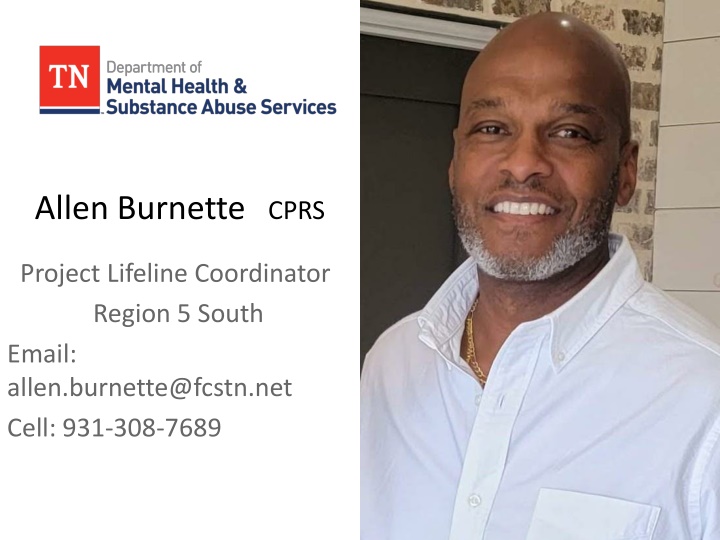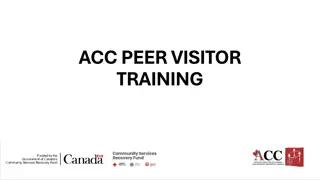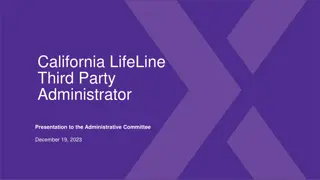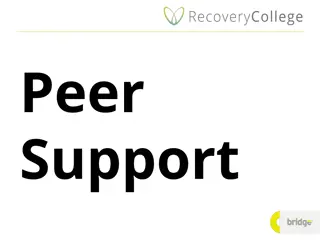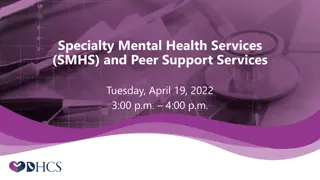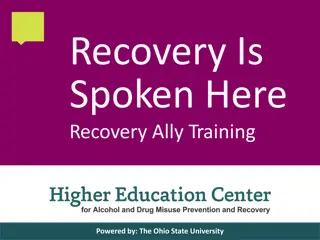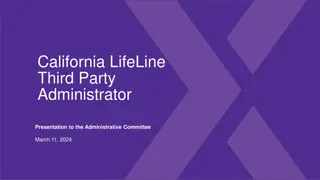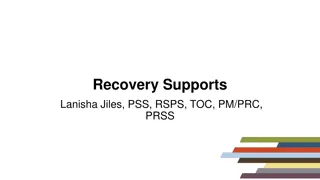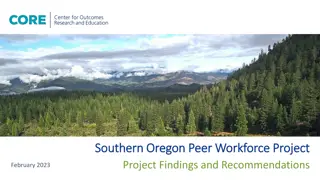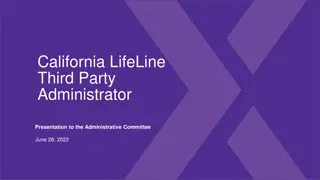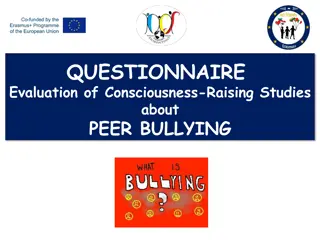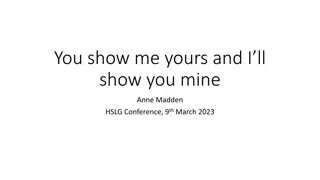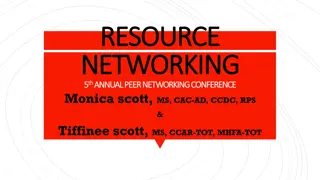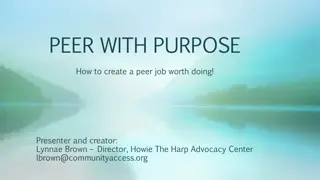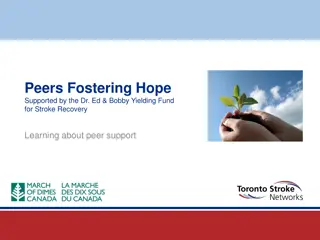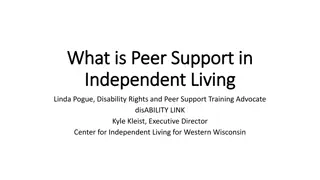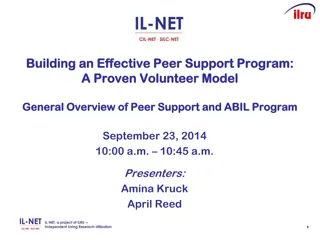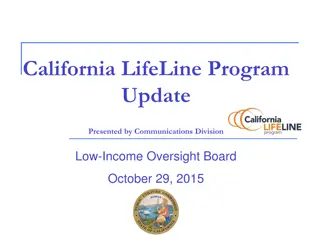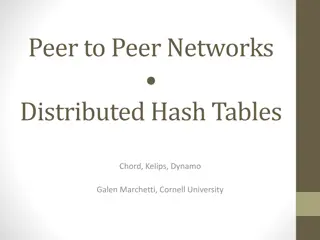Lifeline Peer Project: Raising Awareness for Recovery Services
The Lifeline Peer Project aims to reduce addiction stigma, promote community support for recovery services, and educate on addiction. Certified Peer Recovery Specialists help individuals on the path to recovery, offering support and empowerment through their personal stories. Organizations are encouraged to appoint CPRS champions to facilitate referrals and support for individuals with substance use disorders. Various community resources, including prevention coalitions and health departments, play a vital role in enhancing recovery efforts.
Download Presentation

Please find below an Image/Link to download the presentation.
The content on the website is provided AS IS for your information and personal use only. It may not be sold, licensed, or shared on other websites without obtaining consent from the author.If you encounter any issues during the download, it is possible that the publisher has removed the file from their server.
You are allowed to download the files provided on this website for personal or commercial use, subject to the condition that they are used lawfully. All files are the property of their respective owners.
The content on the website is provided AS IS for your information and personal use only. It may not be sold, licensed, or shared on other websites without obtaining consent from the author.
E N D
Presentation Transcript
Allen Burnette CPRS Project Lifeline Coordinator Region 5 South Email: allen.burnette@fcstn.net Cell: 931-308-7689
Through My Journey of Recovery, I Became: Hopeful Employable Dependable Formal Education Father Selfless Trustworthy
Lifeline Peer Project Raising Awareness and Opportunities for Recovery
What is the Lifeline Peer Project The Lifeline Peer Project was established to reduce the stigma related to the disease of addiction and increase community support for policies that provide for treatment and recovery services. Project approaches include: Establishment of evidence-based addiction and recovery programs Educational presentations for civic groups, faith-based organizations, and community leaders to increase understanding of the disease of addiction and support for recovery strategies.
Connection to Recovery Resources Certified Peer Recovery Specialists Help others on the path to recovery from mental illness or substance abuse. Have firsthand experience with mental illness and/or substance abuse and can offer support and understanding. Have at least two years of active recovery. Use their personal recovery story to help others. Promote self-determination, personal responsibility, and empowerment. For more info: https://www.tn.gov/behavioral-health/mental-health-services/cprs/peer-recovery-services/certified-peer- recovery-specialist-program.html
CPRS Champion in YOUR Organization At least one individual in each congregation to become the point person. Provide referrals and recovery resources for individuals with SUDs and Mental Health Issues. Be active in the congregation. Train others to help. Help the congregation understand the reality of Mental Health and Addiction and provide support to those in need. For more info: https://www.tn.gov/behavioral-health/mental-health-services/cprs/peer-recovery-services/certified-peer- recovery-specialist-program.html
Connection to Other Community Resources Resources to access and leverage across your state might include: Community Prevention Coalitions Treatment and Recovery Courts Addiction Recovery Program (ARP) Agencies Local Health Departments/Councils Health Educators Local Law Enforcement Agencies Nonprofit Organizations Colleges /Universities
Lifeline Peer Project Results There are 17 Lifeline Peer Project Coordinators Each located in Substance Abuse Prevention Coalitions across the state Lifeline s Outcomes: Over 6,352 recovery trainings Referred over 14,989 people to treatment and recovery support services Started over 676 new recovery meetings
Fighting Stigma to Save Lives Focus on stigma reduction Stigma generates multiple barriers for people with an substance use disorder to seek treatment, receive treatment, and stay in recovery. People with SUD can progress on their path to recovery and still be faced with these barriers. Stigma related to addiction often overlaps and intensifies with other forms of stigma, discrimination, and bias, such as those related to race, class, gender, sexual orientation, occupation, and others. SUD in TN Nearly 6 people in Tennessee die of a drug-related overdose each day. 82% of drug overdose deaths in Tennessee involved opioids. Almost half of the general public know someone who is living with an opioid addiction. Despite increasing access to telemedicine, opioid-related deaths have dramatically increased during the COVID-19 pandemic.
The Office of Faith-Based Initiatives Connection Faith-Based Community Coordinators recruit and build relationships with congregations willing to help guide their members and community to recovery Project Lifeline connects people with treatment and recovery support resources and serves as a single point of contact for Recovery Congregations seeking to establish support meetings and help others find treatment Tennessee Recovery Navigators work with Project Lifeline to identify community-based resources including, but not limited to, Recovery Congregations and are stationed in emergency departments to help those who have experienced overdose or drug- related injury Regional Overdose Prevention Specialists train people to administer Naloxone to prevent overdose deaths All four are designed to meet people where they are to encourage long-term recovery
Effects of Stigma Shame and social isolation; for those addicted, reduces a whole person to someone who is broken, with little or no self-esteem; less than 20% of Americans are willing to associate closely with someone who is addicted to prescription drugs as a friend, colleague, or neighbor Individuals not seeking help for their addiction around 20% of those addicted cite stigma as a reason for not seeking treatment
What are we doing Town Hall Event Community educational events Judicial System Working with to offer diversions and alternative sentencing. Faith Forums Educating our faith communities. Recovery Fest Celebrating Recovery Health Fairs Sharing Resources Social Media PSAs and Pod Cast Public Speaking Sharing our story of recovery
Record of Attendance How can we partner together? How can we better serve you?
We welcome your questions!
